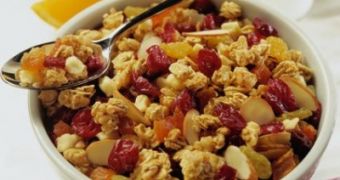Cereal makers are about to take a serious hit as a new EU regulation is being lined up. Because of the many health claims that come on cereal boxes, which often omit to include the extra amounts of sugar, salt and fat, the Food Standards Agency in the UK and the European Food Safety Authority (Efsa) will see that all cereal makers will no longer include health claims on the package unless they can also prove them scientifically, as Times Online informs.
Major brands in the UK will be considerably affected by the crackdown, which will undoubtedly also take its toll on the £1.3-billion-a-year industry. At this point in time, the Efsa is investigating about 4,000 health claims made by various brands, some of which say they stimulate growth, improve digestion, offer a surplus of vitamins, and even protect the heart. All these are possible by means of extra ingredients that are, most of the time, not even mentioned on the package, because they contain high levels of fat, sugar or salt, well above the recommended limit.
“Cereal manufacturers make a variety of health claims. Some are genuine, but other foods are heavily promoted on the basis of health claims for one ingredient, while unhealthy levels of sugar, fat and salt hardly get a mention.” Corinne Vaughan, deputy head of nutrition at the Food Standards Agency, says for Times Online. Susan Jebb, head of the Medical Research Council’s human nutrition unit, agrees that all the health claims must be backed up by proof, saying, “We need more clarity in the science behind the claims and in the labeling.”
The measure to prevent manufacturers from marketing a product solely on health claims that are often not even substantiated in any way also means the EU will try to block them from promoting their products based on one or two of these claims when they come with high levels of salt, fat or sugar. However, as of now, the real issue is to determine the exact level of “high,” as well as the measures taken against those manufacturers that continue with their deceiving advertising factors.
As for the brands that will be the most affected, they include Kellogg’s (Special K, Frosties and Optivita) and Nestle (Shreddies and Cheerios), the Times Online says. “Kellogg’s, which admits making a ‘five-figure’ donation to Heart UK, accepts there is no published scientific evidence to show that eating a daily bowl of Optivita lowers cholesterol.” the Times writes. However, brands of muesli will also take a hit, the same source adds, as their health benefits often hide their high levels of sugar.

 14 DAY TRIAL //
14 DAY TRIAL //